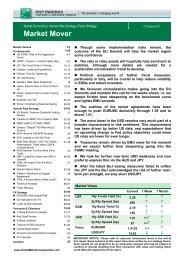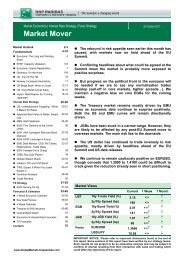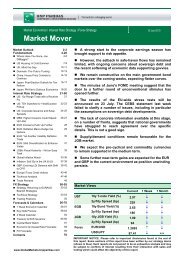MARKET MOVER - BNP PARIBAS - Investment Services India
MARKET MOVER - BNP PARIBAS - Investment Services India
MARKET MOVER - BNP PARIBAS - Investment Services India
You also want an ePaper? Increase the reach of your titles
YUMPU automatically turns print PDFs into web optimized ePapers that Google loves.
ECB on a different page…<br />
…but its bark may be<br />
worse than its bite<br />
BoE shifts towards<br />
additional QE<br />
Yield curves back in bullflattening<br />
mode, with<br />
upcoming data key<br />
High demand from banks<br />
at ECB’s 3-month op<br />
JGB market takes its lead<br />
from elsewhere; superlongs<br />
favoured<br />
Upward pressure on JPY,<br />
downward pressure on<br />
GBP<br />
The Fed’s intentions and those of the ECB look increasingly divergent. While<br />
the ECB’s decision to extend the full allotment procedure for all refinancing<br />
operations until year-end was sensible, it was accompanied in the August<br />
press conference by an assertion from President Trichet that the ECB is still<br />
“in the process of phasing out” its unconventional measures. This was then<br />
followed by comments from Governing Council members highlighting their<br />
discomfort with the “addiction” of some banks to ECB funding.<br />
Will the ECB’s bark be worse than its bite? Given the U-turns which the ECB<br />
has been forced to make before, this is our assumption. The most recent<br />
activity data in the eurozone – most notably the flash PMIs for September –<br />
also signal that the slowdown in growth is gathering momentum. Still, on the<br />
basis of what we hear from the ECB, the risk of a premature exit remains<br />
highest in the eurozone in our view.<br />
The Bank of England MPC, in contrast, seems to be taking some baby steps<br />
towards further easing. That Mr Sentance again voted for a rate rise earlier<br />
this month was not a surprise. But the MPC meeting minutes revealed a<br />
greater concern from more than one member about the increased risk of a<br />
hard landing for the UK economy. There is growing sympathy for further QE<br />
but this has not yet been sufficient to prompt a formal dissent in that<br />
direction.<br />
Unlike the Fed, the Bank of England has its hands tied by elevated inflation<br />
and the risk that this poses to inflation expectations. Our view has been that,<br />
by early 2011, more concrete signs that the downside risks to growth are<br />
materialising and the upside risks to inflation are not would open the door to<br />
additional QE. The MPC minutes, plus recent signs of a lurch downwards in<br />
UK activity, suggest even earlier action is possible.<br />
Yield curves are back in bull-flattening mode post-FOMC. The question is<br />
whether the FOMC statement was the trigger for a new bullish phase or if<br />
further evidence of a US and European slowdown is a precondition for a<br />
lasting rally. In the aftermath of the FOMC, it seems that ‘risk on’ is fizzling<br />
out, reflected in faltering equity markets.<br />
Upcoming data will be pivotal in this respect. Further evidence of slowing<br />
activity and a renewed deceleration in core inflation – both of which we<br />
expect – will be needed for yields to hit new lows.<br />
In the eurozone, keep an eye on the expiry of the ECB’s EUR 225bn of<br />
liquidity provided through 3mth, 6mth and 12mth tenders. Given the origin of<br />
demand at these tenders – mainly banks in the periphery – it is likely that<br />
demand at the 3mth tender at the end of the month will be high from this<br />
source. The upcoming operation will result in a decrease in liquidity but<br />
excess liquidity will persist for a while yet.<br />
The JGB market has moved back into bull-flattening mode, helped by market<br />
developments externally, with the 10-year JGB yield once again approaching<br />
the 1% level and the super-long sector also performing strongly. Volatility<br />
throughout the super-long sector has increased but investor demand is<br />
robust and we expect super-longs to continue to perform well.<br />
Global liquidity conditions will continue to drive currency markets. High beta<br />
and commodity currencies will remain in focus despite increasing signs that<br />
global growth is slowing.<br />
USD/JPY continues to drift lower with commercial JPY buying interest being<br />
the dominant flow. The credibility of Japanese authorities is again likely to be<br />
tested as expectations of Fed action add to pressure for further intervention.<br />
A strong JPY and weak stock prices are particularly unwelcome, given that<br />
the fiscal half-year closing is fast approaching.<br />
With the Bank of England becoming more inclined to further QE, we keep<br />
our EUR/GBP long and GBP/AUD short positions.<br />
Ken Wattret 23 September 2010<br />
Market Mover<br />
3<br />
www.GlobalMarkets.bnpparibas.com
















